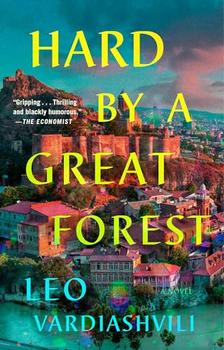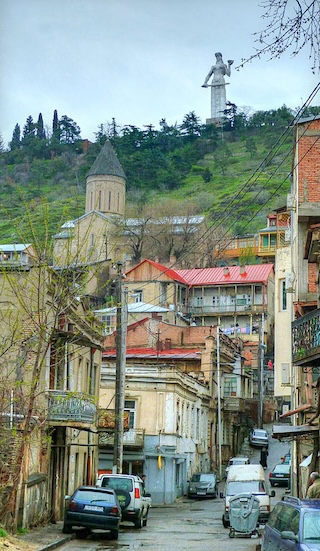Summary | Excerpt | Reading Guide | Reviews | Beyond the Book | Read-Alikes | Genres & Themes | Author Bio

A Novel
by Leo VardiashviliThis article relates to Hard by a Great Forest
In Leo Vardiashvili's Hard by a Great Forest, young Saba and his brother and father flee their home in Tbilisi, Georgia, when the city erupts in violence. "We heard gunfire by night and saw brass twinkling on the pavement in the mornings, as though it had rained shell casings all over Tbilisi," Saba says. "[W]hen a stray tank shell breaks the barrier by your bedroom window, screams on, and deletes the corner grocery shop and the entire family living above it, you'll begin to make plans."
 Strategically located at the crossroads of Europe and Asia, Georgia's capital city has suffered bloodshed and violence at the hands of invading armies throughout its history, from the Persians to the Ottomans to the Russians. In Vardiashvili's novel, however, the conflict that displaces Saba and his family is homegrown—the Georgian civil war that broke out in 1991, a few months after the country gained independence after seventy years of Soviet control.
Strategically located at the crossroads of Europe and Asia, Georgia's capital city has suffered bloodshed and violence at the hands of invading armies throughout its history, from the Persians to the Ottomans to the Russians. In Vardiashvili's novel, however, the conflict that displaces Saba and his family is homegrown—the Georgian civil war that broke out in 1991, a few months after the country gained independence after seventy years of Soviet control.
"Good times lasted as long as the Soviet supplies did," Saba explains. "Then the civil war really kicked into gear." Exacerbated by a collapsing economy, ethnic tensions and political instabilities thrust the newly independent country into civil strife. On December 22, 1991, violent clashes broke out in downtown Tbilisi when armed opposition groups staged a coup to overthrow Zviad Gamsakhurdia, Georgia's first democratically elected president, just months after he took office.
Tbilisi was blitzed by tanks and mortars for two weeks, with the intense street fighting subsiding only after Gamsakhurdia fled the country on January 6, 1992. But the coup triggered a full-scale civil war that dragged on for another two years, with Russian-backed separatists in the regions of South Ossetia and Abkhazia battling for autonomy. Even after the war's end, Georgia was plunged into grinding poverty for the next decade. "Food was scarce," Saba says. "No running water, no gas, no electricity."
When Saba returns to his home country almost two decades later, he finds a Tbilisi trying to remake itself with gleaming skyscrapers and shiny, modern shopfronts. But in the shabby backstreets of the city, decrepit buildings with crumbling facades sink into disrepair—the still-visible signs of a legacy of war, poverty and privation. And South Ossetia, where Saba travels with his sidekick Nodar, remains a disputed territory, an embattled danger zone where Georgian, Ossetian and Russian forces still trade sniper fire and the scars of conflict run deep—like the traumas borne both by those who survive war and by those, like Saba, whom it uproots.
The Kartlis Deda (Mother of Georgia) statue towers over Tbilisi, where it commemorates the Georgian people's defense against outside invaders, courtesy of Roberto Strauss
Filed under Society and Politics
![]() This "beyond the book article" relates to Hard by a Great Forest. It originally ran in February 2024 and has been updated for the
January 2025 paperback edition.
Go to magazine.
This "beyond the book article" relates to Hard by a Great Forest. It originally ran in February 2024 and has been updated for the
January 2025 paperback edition.
Go to magazine.
Knowledge is of two kinds. We know a subject ourselves, or we know where we can find information on it.
Click Here to find out who said this, as well as discovering other famous literary quotes!
Your guide toexceptional books
BookBrowse seeks out and recommends the best in contemporary fiction and nonfiction—books that not only engage and entertain but also deepen our understanding of ourselves and the world around us.